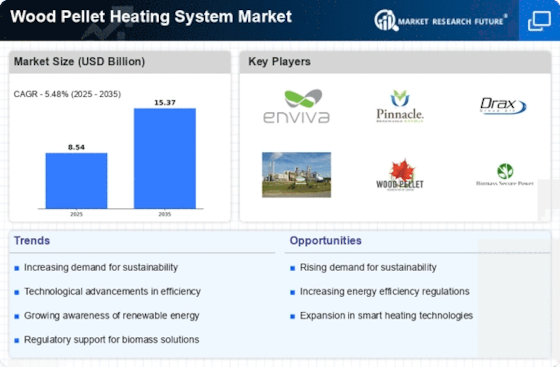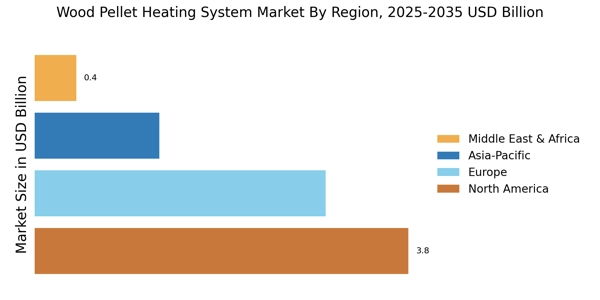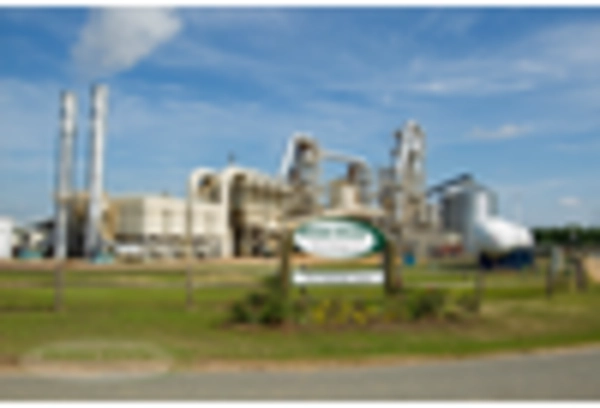Rising Energy Costs
The Wood Pellet Heating System Market is experiencing a surge in interest due to rising energy costs associated with traditional fossil fuels. As prices for oil, gas, and electricity continue to fluctuate, consumers are increasingly seeking alternative heating solutions that offer cost stability. Wood pellet heating systems present a viable option, as they often provide lower operational costs compared to conventional heating methods. Market data suggests that the average cost of heating with wood pellets can be significantly lower than that of oil or propane, making it an appealing choice for budget-conscious consumers. This trend is likely to drive further adoption of wood pellet systems, as households and businesses look for ways to mitigate energy expenses.
Increased Availability of Wood Pellets
The Wood Pellet Heating System Market is benefiting from the increased availability of wood pellets, driven by both domestic production and imports. As demand for wood pellet heating systems rises, manufacturers and suppliers are expanding their production capabilities to meet this need. Data suggests that the production of wood pellets has seen a steady increase, with many regions investing in infrastructure to support pellet manufacturing. This enhanced supply chain not only ensures that consumers have access to affordable wood pellets but also stabilizes prices in the market. Consequently, the growing availability of wood pellets is likely to support the continued expansion of the wood pellet heating market, as more users find it convenient to switch to this renewable heating option.
Regulatory Support for Renewable Energy
The Wood Pellet Heating System Market benefits from increasing regulatory support aimed at promoting renewable energy sources. Governments are implementing policies that incentivize the use of biomass heating systems, including wood pellets. This regulatory framework often includes tax credits, grants, and subsidies that encourage both residential and commercial users to adopt wood pellet heating solutions. As a result, the market is likely to experience growth, with projections indicating a compound annual growth rate of around 10% over the next few years. Such supportive measures not only enhance the attractiveness of wood pellet systems but also align with broader environmental goals, thereby fostering a more sustainable energy landscape.
Technological Innovations in Heating Systems
The Wood Pellet Heating System Market is poised for growth due to ongoing technological innovations that enhance the efficiency and usability of wood pellet systems. Advances in combustion technology, automation, and control systems have made modern wood pellet boilers more efficient and user-friendly. For instance, new models often feature automated feeding systems and smart controls that optimize fuel usage and reduce emissions. Market analysis indicates that these innovations not only improve the performance of wood pellet heating systems but also make them more appealing to a broader audience. As technology continues to evolve, it is likely that the market will attract new customers who prioritize efficiency and convenience in their heating solutions.
Environmental Awareness and Carbon Footprint Reduction
The Wood Pellet Heating System Market is significantly influenced by growing environmental awareness among consumers and businesses. As individuals become more conscious of their carbon footprints, there is a marked shift towards sustainable heating solutions. Wood pellet systems are often perceived as a cleaner alternative to fossil fuels, as they utilize renewable biomass and can contribute to lower greenhouse gas emissions. This shift in consumer behavior is supported by studies indicating that wood pellets can reduce carbon emissions by up to 80% compared to traditional heating methods. Consequently, the increasing demand for eco-friendly heating options is likely to propel the growth of the wood pellet heating market, as more users seek to align their heating choices with their environmental values.

















